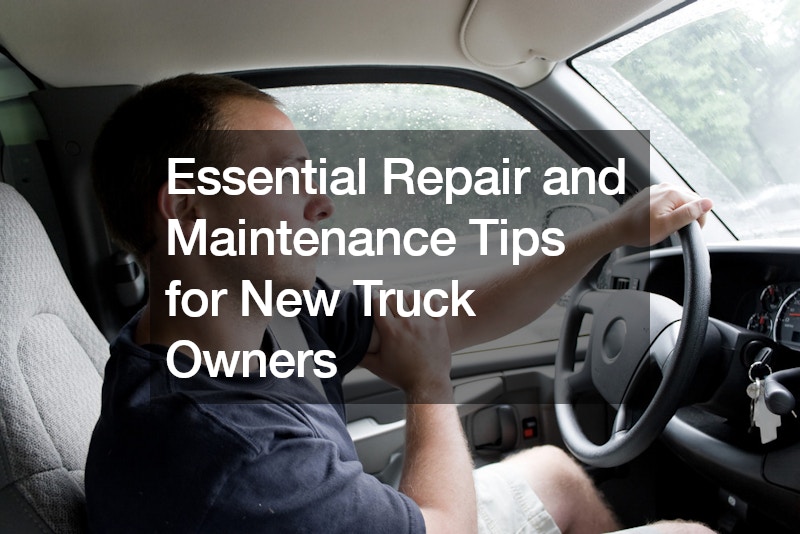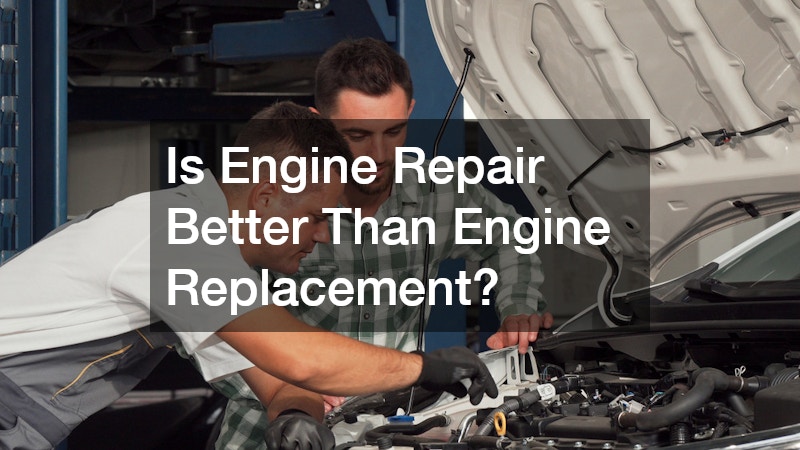
Owning a truck is a significant investment, whether it’s for personal use, business, or a combination of both. To ensure your truck runs smoothly and remains reliable for years to come, regular maintenance and timely repairs are crucial. In this comprehensive guide, we’ll cover essential tips for maintaining and repairing your truck, helping you get the most out of your vehicle. From understanding basic maintenance tasks to knowing when to seek professional help, this blog will provide valuable insights for new truck owners.
Understanding Your Truck’s Needs
Every truck has unique maintenance requirements based on its make, model, and usage. Familiarize yourself with your truck’s owner manual, which contains vital information about maintenance schedules, fluid types, and other essential details. Regularly inspect your truck to catch any potential issues early and address them before they become significant problems.
Routine Maintenance Tasks
Routine maintenance is the backbone of truck longevity. Here are some key tasks you should regularly perform:
Oil Changes
Oil is the lifeblood of your truck’s engine. Regular oil changes keep the engine lubricated, reducing wear and tear. Most experts recommend changing the oil every 3,000 to 5,000 miles, but this can vary based on your truck’s usage and the type of oil used. Synthetic oils might allow for longer intervals, but it’s crucial to follow the manufacturer’s recommendations to avoid voiding warranties and ensuring optimal performance.
Tire Maintenance
Tires are critical for your truck’s safety and performance. Regularly check tire pressure and tread depth. Rotate your tires every 6,000 to 8,000 miles to ensure even wear. Proper tire maintenance can improve fuel efficiency and extend the life of your tires. Additionally, balancing and aligning your tires can prevent uneven wear and improve handling, ensuring a smoother and safer ride.
Brake Inspection
Brakes are essential for your safety. Regularly inspect brake pads, rotors, and fluid levels. Listen for any unusual noises when braking and address them immediately. Worn-out brakes can compromise your safety and lead to costly repairs. Remember, brake fluid absorbs moisture over time, which can lead to brake failure. Regularly replacing the brake fluid as part of your maintenance routine is crucial for maintaining braking efficiency.
Fluid Levels
Check all fluid levels, including engine oil, coolant, brake fluid, transmission fluid, and power steering fluid. Maintaining proper fluid levels prevents overheating and ensures all systems function correctly. Low fluid levels can indicate leaks, which should be addressed promptly to avoid further damage. For instance, low coolant levels can lead to engine overheating, while insufficient transmission fluid can cause shifting problems.
Choosing the Right Truck Shops
Finding a reliable auto repair garage is crucial for maintaining your truck. Look for truck shops with certified technicians who specialize in your truck’s make and model. Reading reviews and asking for recommendations can help you find a trustworthy shop. Establishing a relationship with a reliable mechanic can save you time and money in the long run. A good truck shop will provide transparent pricing, detailed explanations of needed repairs, and quality customer service.
Diesel Truck Service
If you own a diesel truck, it’s essential to understand the specific maintenance needs of diesel engines. Diesel engines require regular fuel filter changes, coolant checks, and glow plug inspections. Diesel truck service should be performed by technicians experienced with diesel engines to ensure proper care and maintenance. Diesel engines also benefit from regular checks of the turbocharger and exhaust system, as these components can be more complex and prone to specific issues compared to gasoline engines.
Semi Truck Repair
For semi truck owners, regular maintenance is even more critical due to the heavy loads and long distances these trucks travel. Semi truck repair should include regular inspections of the suspension, brakes, and drivetrain. Keeping up with maintenance schedules and addressing issues promptly can prevent costly breakdowns on the road. For semi trucks, it’s also important to check the air brake system, as this is a critical component for safety, especially under heavy loads.
Trailer Maintenance
If you use a trailer with your truck, don’t overlook its maintenance. Regularly inspect the trailer’s tires, lights, brakes, and hitch. Keeping your trailer in good condition ensures safe and efficient transportation of goods. Trailers with multiple axles require regular checks on bearings and seals to prevent wear and tear. Additionally, ensure that the wiring for lights and signals is intact and functioning properly to avoid accidents and comply with road regulations.
Manual Transmission Care
Trucks with manual transmissions require specific maintenance to keep them running smoothly. Regularly check the transmission fluid and change it as recommended by the manufacturer. Pay attention to any changes in the feel of the clutch or difficulty shifting gears, as these can be signs of transmission issues. Manual transmissions might also require periodic adjustments to the clutch and linkage to ensure smooth operation. If you experience grinding noises or slippage, it’s important to have it inspected immediately by a professional.
Importance of Professional Help

While regular maintenance tasks can be performed by truck owners, some repairs require the expertise of a truck repair expert. Knowing when to seek professional help can prevent further damage and ensure your truck is repaired correctly. Complex issues such as engine diagnostics, transmission rebuilds, and electrical system troubleshooting are best left to professionals with the necessary tools and experience.
Finding the Right Trailer Dealer
If you’re in the market for a trailer, finding the right trailer dealer is essential. Look for dealers with a wide selection of trailers that meet your needs. Reputable dealers will offer trailers from trusted manufacturers and provide valuable advice on choosing the right trailer for your truck. They will also offer after-sales support, which includes maintenance tips, repair services, and warranty assistance.
Exploring Jeep Accessories
Jeep accessories can enhance the functionality and appearance of your truck. From off-road lights and winches to roof racks and cargo organizers, there are numerous accessories available to customize your Jeep. Regularly inspect and maintain these accessories to ensure they remain in good working condition. For instance, winches should be periodically tested and maintained to ensure they function correctly in emergency situations, and roof racks should be checked for secure mounting to avoid accidents.
Trucks for Rent
If you occasionally need an extra truck, consider renting one. Many truck rental companies offer a variety of trucks for rent, from small pickups to large commercial vehicles. Renting a truck can be a cost-effective solution for temporary needs without the commitment of ownership. Ensure that the rental truck is well-maintained and inspect it thoroughly before use to avoid any issues during your rental period.
Heavy Trucking Maintenance
For owners of heavy trucks, maintenance is even more critical due to the demanding nature of heavy trucking. Regularly inspect and maintain the suspension, brakes, and engine to ensure your truck can handle the heavy loads. Preventive maintenance can reduce downtime and keep your truck on the road. It’s also important to keep detailed maintenance records to track the performance and service history of your heavy truck, which can be useful for warranty claims and resale value.
Seasonal Maintenance Tips

Different seasons bring different challenges for truck maintenance. Here are some seasonal tips to keep your truck in top shape year-round:
Winter Maintenance
Winter can be harsh on your truck. Prepare for cold weather by checking the battery, coolant, and antifreeze levels. Inspect the tires for adequate tread and consider using winter tires for better traction. Regularly wash your truck to remove salt and prevent rust. Additionally, ensure that your windshield washer fluid is rated for freezing temperatures and check the operation of your heater and defroster to ensure they work efficiently.
Spring Maintenance
Spring is an excellent time for a thorough inspection and cleaning. Check for any damage caused by winter conditions, such as rust or corrosion. Inspect the brakes, suspension, and steering components. Replace worn-out wiper blades and check the air conditioning system. Spring is also a good time to clean the undercarriage of your truck to remove any remaining salt or debris from winter driving.
Summer Maintenance
Hot weather can strain your truck’s cooling system. Check the coolant levels and ensure the radiator is clean. Inspect the belts and hoses for any signs of wear. Regularly check the tire pressure, as heat can cause it to fluctuate. Additionally, ensure that your air conditioning system is functioning properly to keep the cabin cool and comfortable during the hot months.
Fall Maintenance
Fall is the perfect time to prepare your truck for the colder months ahead. Check the heating system and defroster to ensure they work correctly. Inspect the tires and brakes for wear. Consider applying a protective wax coating to protect the paint from the elements. Fall is also an ideal time to check the condition of your battery and replace it if it shows signs of weakness, as cold weather can significantly reduce battery performance.
Common Truck Problems and How to Fix Them

Understanding common truck problems can help you identify issues early and take appropriate action. Here are some common problems and their solutions:
Engine Overheating
Engine overheating can be caused by low coolant levels, a faulty thermostat, or a damaged radiator. Regularly check the coolant levels and inspect the radiator for leaks. If the problem persists, seek professional help. Overheating can also be caused by a failing water pump or a clogged radiator, both of which require immediate attention to prevent engine damage.
Transmission Issues
Transmission problems can manifest as difficulty shifting gears, slipping gears, or strange noises. Regularly check the transmission fluid and change it as needed. If you experience persistent issues, consult a truck repair expert. Additionally, transmission issues can be caused by worn-out clutch components in manual transmissions or faulty sensors and solenoids in automatic transmissions.
Brake Problems
Brake problems can include squeaking noises, reduced braking power, or a soft brake pedal. Regularly inspect the brake pads, rotors, and fluid levels. Address any issues immediately to ensure your safety. Brake problems can also be caused by worn-out brake lines, which may need to be replaced to ensure proper brake function.
Electrical Issues
Electrical problems can include dead batteries, faulty lights, or malfunctioning gauges. Regularly inspect the battery and electrical connections. Replace any faulty components and ensure all lights and signals work correctly. Electrical issues can also be caused by corroded connectors or damaged wiring, which should be inspected and repaired by a professional.
Extending the Life of Your Truck
Taking proactive steps can extend the life of your truck and reduce the need for costly repairs. Here are some tips to keep your truck running smoothly:
Regular Maintenance
Stick to the recommended maintenance schedule outlined in your truck’s owner manual. Regular oil changes, fluid checks, and tire rotations can prevent many common issues and keep your truck in good condition. Consistent maintenance also helps to maintain fuel efficiency and reduces the likelihood of unexpected breakdowns.
Address Issues Promptly
Don’t ignore warning signs or minor problems. Addressing issues promptly can prevent them from becoming major repairs. Regular inspections can help you catch problems early. For example, a small oil leak might only require a gasket replacement, but if ignored, it could lead to significant engine damage.
Drive Responsibly
How you drive can impact your truck’s longevity. Avoid aggressive driving, overloading, and excessive idling. Driving responsibly can reduce wear and tear on your truck’s components. Gentle acceleration and braking can also reduce stress on the drivetrain and improve fuel efficiency.
Keep It Clean
Regularly washing your truck can prevent rust and corrosion. Pay special attention to the undercarriage, where dirt and salt can accumulate. A clean truck not only looks better but also lasts longer. Waxing your truck periodically can protect the paint and reduce the impact of environmental factors such as UV rays and acid rain.
Advanced Maintenance Tips
For those looking to go beyond the basics, here are some advanced maintenance tips to keep your truck in peak condition:
Engine Diagnostics
Modern trucks are equipped with advanced computer systems that can detect and diagnose issues. Investing in a diagnostic tool can help you identify problems early. These tools can read error codes from your truck’s computer, providing valuable information about engine performance and potential issues.
Suspension Maintenance
The suspension system is critical for handling and ride comfort. Regularly inspect shock absorbers, struts, and springs for wear and damage. Replacing worn suspension components can improve handling and extend tire life. Suspension issues can also affect alignment, leading to uneven tire wear and handling problems.
Exhaust System
The exhaust system helps reduce emissions and noise. Regularly inspect the exhaust pipes, mufflers, and catalytic converters for leaks and damage. Addressing exhaust issues promptly can improve performance and reduce harmful emissions. Additionally, a well-maintained exhaust system can improve fuel efficiency and engine performance.
Air Filter Replacement
The air filter prevents dirt and debris from entering the engine. A clogged air filter can reduce engine performance and fuel efficiency. Regularly inspect and replace the air filter as needed. Upgrading to a high-performance air filter can also enhance engine performance and extend the intervals between replacements.
Owning a truck comes with responsibilities, but with regular maintenance and timely repairs, you can ensure your truck remains reliable and efficient for years to come. By following the tips outlined in this guide, you’ll be well-equipped to handle common maintenance tasks and know when to seek professional help. Remember, a well-maintained truck is a safer, more dependable vehicle that can serve you well in all your endeavors.
Regularly visiting a reliable auto repair garage, investing in diesel truck service, and understanding the specific needs of your truck will pay off in the long run. Whether you’re dealing with a semi truck repair or looking for the best jeep accessories, staying proactive with maintenance will keep your truck in top condition.
By taking care of your truck and following these essential repair and maintenance tips, you’ll enjoy a smoother, more reliable ride, ensuring your investment remains valuable for many years. Happy trucking!






